#FANTASTIC FICTION at KGB
Text
#josh rountree#the legend of charlie fish#FANTASTIC FICTION at KGB#the mysterious bookshop#sam j miller#Benjamin Percy#nyc
3 notes
·
View notes
Text
My upcoming appearances!
I have a novel coming out in November! The Kuiper Belt Job is a caper story in space, a mash-up of Firefly, Leverage, and The Expanse. It's an ensemble piece with complex character relationships and a twisty, compelling plot, but beneath the entertaining surface it raises deep questions about identity and personhood. In a world where minds can be copied, what does it mean to be "me"? I've already set up a bunch of personal appearances to support the novel, with more to come. Here's what I have so far!
Jul 19-24, 2023: Pemmi-Con, Winnipeg, Manitoba
Sep 22-24, 2023: Rose City Comic Con, Portland, Oregon
Oct 26-29, 2023: World Fantasy Convention, Kansas City, Missouri
Oct 11, 2023: Fantastic Fiction at KGB, New York, New York
Nov 8, 2023: The Book Corner with D.C. Gomez, Live on Amazon
Nov 9, 2023: Powell's Books at Cedar Hills Crossing, Beaverton, Oregon
Nov 10-12, 2023: OryCon, Portland, Oregon
Nov 16, 2023: Deep Dish Reading Series, Chicago, Illinois
Nov 21, 2023: University Bookstore, Seattle, Washington
Nov 29 - Dec 4, 2023: Teslacon, Madison, Wisconsin
Dec 8, 2023: Charm City Spec, Baltimore, Maryland
Feb 25, 2024: SF in SF, San Francisco, California
Keep an eye on https://daviddlevine.com/about/upcoming-appearances/ for updates!
0 notes
Text
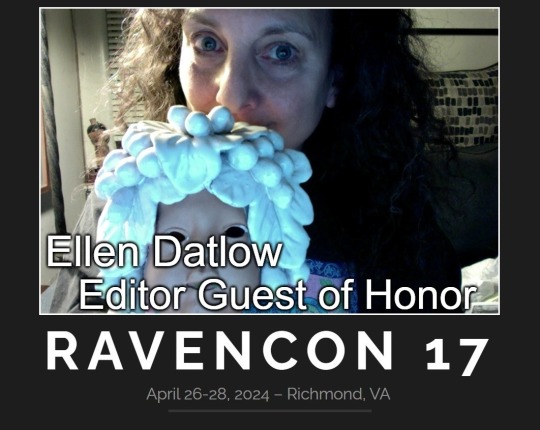
This year's Editor Guest of Honor is Ellen Datlow.
https://www.ravencon.com/ellen-datlow/
Ellen Datlow has been editing sf/f/h short fiction for four decades. She currently acquires short stories and novellas for Tor.com and Nightfire. She has edited numerous anthologies for adults, young adults, and children, including The Best Horror of the Year annual series, When Things Get Dark: Stories inspired by Shirley Jackson, Screams From the Dark: 19 Tales of Monsters and the Monstrous, and Christmas and Other Horrors. She’s won multiple Locus, Hugo, Stoker, International Horror Guild, Shirley Jackson, and World Fantasy Awards plus the 2012 Il Posto Nero Black Spot Award for Excellence as Best Foreign Editor. Datlow was named the recipient of the 2007 Karl Edward Wagner Award, given at the British Fantasy Convention for “outstanding contribution to the genre” and was honored with the Life Achievement Award given by the Horror Writers Association, in acknowledgment of superior achievement over an entire career and honored with the World Fantasy Life Achievement Award at the 2014 World Fantasy Convention. The Shirley Jackson Awards, Inc. recently presented her with a special award in recognition of the anthology When Things Get Dark: Stories inspired by Shirley Jackson (Titan Books, 2021).
She runs the Fantastic Fiction at KGB reading series in the east village, NYC, with Matthew Kressel. She can be found on the website Datlow.com, and on Twitter and Facebook.
RavenCon 2024
https://www.ravencon.com/
0 notes
Text
This is such a great interview....god, I miss Bobby. I’ve posted this because otherwise you need to be a subscriber...
I have to be honest, picturing Bobby doing this particular yoga pose makes me need to take a cold shower, lol. The part about his kids asking if he’s going to leave them is heartbreaking ....😭😭. I do love that he’s still baking...
************************
Every Sunday morning the actor Robert Carlyle grabs his mat and heads off for a session of “restorative yoga” in the Canadian port city of Vancouver, where he lives. There is one particular pose — called a “chest-opener”; you lie back, arms supported by bolsters, and release stress and feelings through the abdomen — that has produced remarkable results.
“You hold the pose for up to nine minutes and it releases emotions,” he says. “Out of nowhere I remembered this old lady leading me through the streets of Drumchapel in Glasgow when I was about seven years old, to go to see some wrestling. I hadn’t remembered her since I was a kid. I just lay there crying.”
Carlyle was brought up by his father, Joe, after his mother, Elizabeth, walked out to be with another man when he was four. His father was a painter and decorator, and the pair lived an itinerant existence around the UK in communes, shared houses and even tents. They lived in almost 100 homes. The old woman was his grandmother, Jean, who stepped in to help sometimes.
“That’s what set me off,” Carlyle says. “The realisation that this old woman was my dad’s mum, born in 1895 and survivor of two world wars. And here she was in her seventies, looking out for me when my dad was struggling to get to work.”
Carlyle left school at 16 and followed his father into painting and decorating. Aged 22, he discovered acting and, without formal training, appeared in The Hard Man, Tom McGrath’s play about the notorious Glasgow gangster Jimmy Boyle. After this he was encouraged to enrol at the Royal Scottish Academy of Music and Drama (now the Royal Conservatoire of Scotland).
In the early 1990s he made a name for himself in the ITV detective series Cracker, as well as playing Begbie, the charismatic psycho in the screen adaptation of Irvine Welsh’s novel Trainspotting. Carlyle was lauded as a raw talent able to articulate a new “dirty realism”, although it was his role in the 1997 stripper comedy The Full Monty and as James Bond’s ex-KGB nemesis Renard in the 1999 film The World is Not Enough that catapulted him to international stardom.
“I went through a stage of being very angry about my mother, and that helped to fuel some of those roles,” he says. “As for Begbie in Trainspotting, that was partly me and partly the odd genuine psycho I had encountered in Glasgow.”
At the height of his fame in the 1990s Carlyle was at the centre of Cool Britannia and simultaneously friends with Damon Albarn from Blur and Noel Gallagher, then in Oasis (Carlyle appeared in the video for the single Little By Little). Tony Blair even recommended him for an OBE in the 1998 new year’s honours list. And yet, while at drama school Carlyle feared he might never get work because he wasn’t “posh”.
Now he has come full circle because he is about to play the fictional British prime minister Robert Sutherland in the new six-part Sky drama series Cobra. “Before I opened the script, I actually thought it was about a snake,” he says. “That’s what living away from home does to you.”
Cobra in fact refers to the Cabinet Office Briefing Rooms, the government’s crisis centre where national emergencies from terrorist attacks to natural disasters are handled. In this case the threat comes from a geomagnetic storm resulting from a solar flare that is threatening the worldwide electrical infrastructure. Kettles stop boiling. Cities go dark. Planes drop from the sky.
Carlyle is rigorous in his preparation for roles. When cast as a bus driver in Ken Loach’s 1996 film Carla’s Song he qualified as one. “For a working-class guy from Glasgow, being a prime minister was always going to be challenging,” he says. “I listened to tapes of posh Scottish MPs like [the former foreign secretary] Sir Malcolm Rifkind. He’ll sound like a Scot most of the time, but there are certain turns of phrase when you think, ‘Are you sure this guy is for real?’”
Keen-eyed viewers will have seen Carlyle in the BBC’s adaptation of HG Wells’s The War of the Worlds as the “potentially gay” astronomer Ogilvy. But perhaps only true aficionados will have spotted him as John Lennon in the Beatles tribute film Yesterday. He appeared as a counterfactual, 78-year-old Lennon enjoying his dotage in a bungalow by the sea. Paul McCartney and Ringo Starr approved, but Lennon’s widow Yoko Ono wasn’t happy. “She didn’t like the idea of people seeing John get old, which I understand, but [the director] Danny Boyle argued that John is revered public property,” Carlyle says.
Carlyle wouldn’t accept a credit for the role. “That felt like too much. The chance to play a hero was enough. I don’t think it hurts to occasionally do things for love.”
Lennon’s relationship with his mother, Julia, was fractured too of course, and after a turbulent adolescence and having reached the top of his professional game, Carlyle came to yearn for a family. “I could go anywhere and have anything. [The 1990s] were an extraordinary time. But even then, I was quite a shy person, and I wanted kids and a home and a wife. Every day I am thankful that I found the most fantastic woman to do that with.”
Carlyle met his wife, the make-up artist Anastasia Shirley, while working on Cracker, and they have three children: Ava, 17, Harvey, 15, and Pearce, 13. After ten years in Vancouver, where Carlyle was making the US series Once Upon a Time, his children consider themselves Canadian. Sometimes they ask about his upbringing, an era referred to as his “black and white years”. “‘Dad, tell us about the black and white years,’ they say. It’s pretty heavy telling children about your mother leaving because they look frightened and say, ‘Are you going to bugger off as well?’ When I’ve reassured them, they just look sad. So I say to them, ‘Don’t be sad for me, I got all the love I ever needed. I don’t feel angry or aggrieved. It was her that missed out.’”
Carlyle’s father died of a heart attack in 2006, and in an attempt to work through his grief Carlyle embarked on a tour of the homes they shared together. “That tour was about confirming I had lived that life,” he says. “I’ve been honoured at Buckingham Palace. I’ve done a Bond movie. But I’ve also slept rough with my old man under Brighton pier. It can mess with your head. Going back reminded me where I’m from. I sat in the car weeping.”
For now the family remain in Canada while the children complete their schooling. At weekends he takes them to football, bakes bread (Carlyle taught himself after discovering that Lennon was an accomplished home baker) and the family sometimes go for walks in a local forest.
He celebrated New Year’s Eve in Scotland with his old friend Robert del Naja from Massive Attack and, sooner or later, the family will return for good. It’s striking that Carlyle has not lost his accent. “You don’t lose the accent unless you want to,” he says with a smile. “I love our life in Canada. It’s a beautiful country with beautiful people. But I only have to do a couple of yoga poses to know I’ve got a lot of Britain still inside of me.”
All episodes of Cobra are available from January 17 on Sky One and NOW TV
ROBERT CARLYLE’S PERFECT WEEKEND
Trainspotting or stamp collecting?
Neither — football
Independence or unity?
Unity and collaboration, always
Glasgow or Sheffield?
Glasgow
Green juice for breakfast or the full monty?
Full monty
Night in or night out?
Night in
Last film you saw?
Joker
Country walk or personal trainer?
Country walk
How many unread emails in your inbox?
Around 2,000
What’s your signature dish?
Pasta
I couldn’t get through my weekend without . . .
Football
106 notes
·
View notes
Link
Every Sunday morning the actor Robert Carlyle grabs his mat and heads off for a session of “restorative yoga” in the Canadian port city of Vancouver, where he lives. There is one particular pose — called a “chest-opener”; you lie back, arms supported by bolsters, and release stress and feelings through the abdomen — that has produced remarkable results.
“You hold the pose for up to nine minutes and it releases emotions,” he says. “Out of nowhere I remembered this old lady leading me through the streets of Drumchapel in Glasgow when I was about seven years old, to go to see some wrestling. I hadn’t remembered her since I was a kid. I just lay there crying.”
Carlyle was brought up by his father, Joe, after his mother, Elizabeth, walked out to be with another man when he was four. His father was a painter and decorator, and the pair lived an itinerant existence around the UK in communes, shared houses and even tents. They lived in almost 100 homes. The old woman was his grandmother, Jean, who stepped in to help sometimes.
“That’s what set me off,” Carlyle says. “The realisation that this old woman was my dad’s mum, born in 1895 and survivor of two world wars. And here she was in her seventies, looking out for me when my dad was struggling to get to work.”
Carlyle left school at 16 and followed his father into painting and decorating. Aged 22, he discovered acting and, without formal training, appeared in The Hard Man, Tom McGrath’s play about the notorious Glasgow gangster Jimmy Boyle. After this he was encouraged to enrol at the Royal Scottish Academy of Music and Drama (now the Royal Conservatoire of Scotland).
In the early 1990s he made a name for himself in the ITV detective series Cracker, as well as playing Begbie, the charismatic psycho in the screen adaptation of Irvine Welsh’s novel Trainspotting. Carlyle was lauded as a raw talent able to articulate a new “dirty realism”, although it was his role in the 1997 stripper comedy The Full Monty and as James Bond’s ex-KGB nemesis Renard in the 1999 film The World is Not Enough that catapulted him to international stardom.
“I went through a stage of being very angry about my mother, and that helped to fuel some of those roles,” he says. “As for Begbie in Trainspotting, that was partly me and partly the odd genuine psycho I had encountered in Glasgow.”
At the height of his fame in the 1990s Carlyle was at the centre of Cool Britannia and simultaneously friends with Damon Albarn from Blur and Noel Gallagher, then in Oasis (Carlyle appeared in the video for the single Little By Little). Tony Blair even recommended him for an OBE in the 1998 new year’s honours list. And yet, while at drama school Carlyle feared he might never get work because he wasn’t “posh”.
Now he has come full circle because he is about to play the fictional British prime minister Robert Sutherland in the new six-part Sky drama series Cobra. “Before I opened the script, I actually thought it was about a snake,” he says. “That’s what living away from home does to you.”
Cobra in fact refers to the Cabinet Office Briefing Rooms, the government’s crisis centre where national emergencies from terrorist attacks to natural disasters are handled. In this case the threat comes from a geomagnetic storm resulting from a solar flare that is threatening the worldwide electrical infrastructure. Kettles stop boiling. Cities go dark. Planes drop from the sky.
Carlyle is rigorous in his preparation for roles. When cast as a bus driver in Ken Loach’s 1996 film Carla’s Song he qualified as one. “For a working-class guy from Glasgow, being a prime minister was always going to be challenging,” he says. “I listened to tapes of posh Scottish MPs like [the former foreign secretary] Sir Malcolm Rifkind. He’ll sound like a Scot most of the time, but there are certain turns of phrase when you think, ‘Are you sure this guy is for real?’”
Keen-eyed viewers will have seen Carlyle in the BBC’s adaptation of HG Wells’s The War of the Worlds as the “potentially gay” astronomer Ogilvy. But perhaps only true aficionados will have spotted him as John Lennon in the Beatles tribute film Yesterday. He appeared as a counterfactual, 78-year-old Lennon enjoying his dotage in a bungalow by the sea. Paul McCartney and Ringo Starr approved, but Lennon’s widow Yoko Ono wasn’t happy. “She didn’t like the idea of people seeing John get old, which I understand, but [the director] Danny Boyle argued that John is revered public property,” Carlyle says.
Carlyle wouldn’t accept a credit for the role. “That felt like too much. The chance to play a hero was enough. I don’t think it hurts to occasionally do things for love.”
Lennon’s relationship with his mother, Julia, was fractured too of course, and after a turbulent adolescence and having reached the top of his professional game, Carlyle came to yearn for a family. “I could go anywhere and have anything. [The 1990s] were an extraordinary time. But even then, I was quite a shy person, and I wanted kids and a home and a wife. Every day I am thankful that I found the most fantastic woman to do that with.”
Carlyle met his wife, the make-up artist Anastasia Shirley, while working on Cracker, and they have three children: Ava, 17, Harvey, 15, and Pearce, 13. After ten years in Vancouver, where Carlyle was making the US series Once Upon a Time, his children consider themselves Canadian. Sometimes they ask about his upbringing, an era referred to as his “black and white years”. “‘Dad, tell us about the black and white years,’ they say. It’s pretty heavy telling children about your mother leaving because they look frightened and say, ‘Are you going to bugger off as well?’ When I’ve reassured them, they just look sad. So I say to them, ‘Don’t be sad for me, I got all the love I ever needed. I don’t feel angry or aggrieved. It was her that missed out.’”
Carlyle’s father died of a heart attack in 2006, and in an attempt to work through his grief Carlyle embarked on a tour of the homes they shared together. “That tour was about confirming I had lived that life,” he says. “I’ve been honoured at Buckingham Palace. I’ve done a Bond movie. But I’ve also slept rough with my old man under Brighton pier. It can mess with your head. Going back reminded me where I’m from. I sat in the car weeping.”
For now the family remain in Canada while the children complete their schooling. At weekends he takes them to football, bakes bread (Carlyle taught himself after discovering that Lennon was an accomplished home baker) and the family sometimes go for walks in a local forest.
He celebrated New Year’s Eve in Scotland with his old friend Robert del Naja from Massive Attack and, sooner or later, the family will return for good. It’s striking that Carlyle has not lost his accent. “You don’t lose the accent unless you want to,” he says with a smile. “I love our life in Canada. It’s a beautiful country with beautiful people. But I only have to do a couple of yoga poses to know I’ve got a lot of Britain still inside of me.”
All episodes of Cobra are available from January 17 on Sky One and NOW TV
ROBERT CARLYLE’S PERFECT WEEKEND
Trainspotting or stamp collecting?
Neither — football
Independence or unity?
Unity and collaboration, always
Glasgow or Sheffield?
Glasgow
Green juice for breakfast or the full monty?
Full monty
Night in or night out?
Night in
Last film you saw?
Joker
Country walk or personal trainer?
Country walk
How many unread emails in your inbox?
Around 2,000
What’s your signature dish?
Pasta
I couldn’t get through my weekend without . . .
Football
#robert carlyle#rc interviews#yoga#vancouver#family#rc photoshoots#GODS HE LOOKS SO GOOD#love that jacket
13 notes
·
View notes
Photo
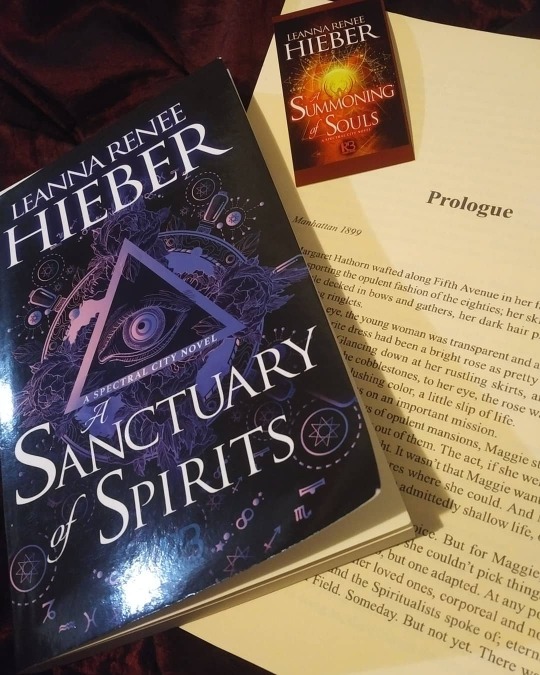
Tomorrow! 7pm EST! Thrilled to be part of (Virtual) KGB Fantastic Fiction! Join us live for readings and an enthusiastic Q & A! Link via KGBfantasticfiction.org! I'll read from A SANCTUARY OF SPIRITS & A SUMMONING OF SOULS! I'll be joined by the talented Ilana C. Meyer! I'd really appreciate support for the Spectral City books of my heart, Sanctuary & Summoning are available for purchase and/or pre-order wherever books are sold! Happy Haunting! Hope to see you online tomorrow! -- #writersofinstagram #authorsofinstagram #kgbfantasticfiction #newbooks #bookevent #bookstagram #virtualtour #sff #womeninsff #GaslampFantasy #fantasyseries #Fantasy #paranormal #historicalfantasy https://www.instagram.com/p/CAZFRURg8vX/?igshid=dygxtdp5smrb
#writersofinstagram#authorsofinstagram#kgbfantasticfiction#newbooks#bookevent#bookstagram#virtualtour#sff#womeninsff#gaslampfantasy#fantasyseries#fantasy#paranormal#historicalfantasy
1 note
·
View note
Text
Chernobyl - Review
6/10/19
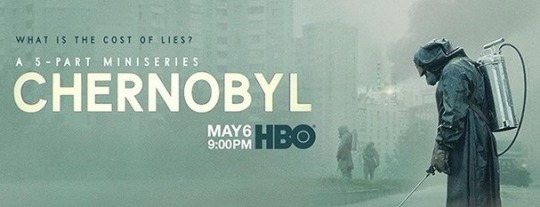
Directed by Johan Renck (HBO)
It’s a surprise how little is known these days about the Chernobyl disaster. Many people may have heard of a horror movie with “Chernobyl” in the title, or remembers that great sniper mission from Call of Duty 4: Modern Warfare. Everyone including myself was caught off guard by this HBO miniseries. I’ve had a passing interest in the meltdown, but if you weren’t an adult in the mid 1980′s, or aren’t from Eastern Europe, you probably have no idea how truly awful and significant this incident was. This historical drama isn’t a soap opera or gore-fest using the "Chernobyl" title. This is a dedicated, macabre, and faithful 5-part series that shows how once again, real life human greed and cowardice caused perfectly avoidable death, suffering, and destruction of innocents. And the most compelling fact of all: it happened just outside of my own life time. This isn’t Game of Thrones--this is the type of corruption that inspires such fiction.
One of the things I like the most about the series is it doesn’t take long to get to the big explosion. In fact, it happens almost immediately in the first episode. This show is less about leading up to a big boom, and more about dwelling on what caused it, and the effects it had on the people surrounding it. The big event also occurs off screen, further showing this show is not about action or spectacle, but about the fallout, yet remains enthralling. Seeing the denial the head nuclear engineer display is absolutely disgusting, especially for what the stakes are. People shift blame, lie, and do everything except take ownership. You feel for the first responders when you learn just how destructive nuclear radiation is. Seeing these guys just 1 or 2 episodes later, rendered into human pulp, suffering until death, just makes you more angry.
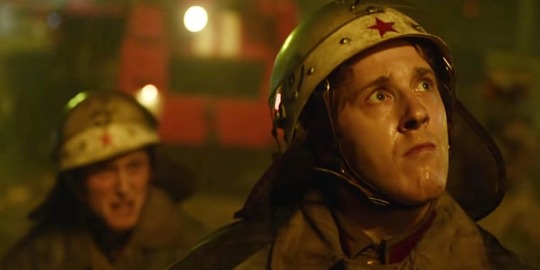
Simply seeing a fireman pick up one of the broken insulating pieced of graphite littered around the factory, and to see his hand disintegrate mere moments later is shocking. To imagine the real people who had to go through this breaks my heart. Occurring during the Cold War, Chernobyl shows how this was the final straw that broke the Soviet Union’s back. The amount of propaganda and lengths the corrupt politicians would go to cover up information, even willingly sacrificing the entire populations surrounding Chernobyl is horrific. Stellan Skarsgard plays a minister’s chairman, and seeing him evolve from a potential antagonist, to aligning with the scientists trying to uncover the truth, is the best arch in the show. Going into trial finally knowing the KGB or Soviet government would find a way to put a bullet in them for telling the truth, is the final nail on the coffin for how much people should be praised for trying to clean it up, and how terrible people are who think they can sweep it under the rug.
Simply seeing men covered in lead trying to shovel off the roofs, or pouring sand directly into the core, and all tactics they tried to come up with to clean it up was hard to see knowing no one had any idea how to deal with this situation. Chernobyl just goes to show that it’s not the nuclear technology’s fault that this occurred, its the men that designed, and eventually, neglected the incredible power they wielded who are to blame. The acting, makeup, and writing are all fantastic. The show does have some pacing issues, as some scenes did drag a bit (especially with the drab color scheme and cinematography) but this is a fantastically entertaining show that also serves as an eye opening history lesson that everyone should see.
8.5/10
1 note
·
View note
Text
Fun read. His case is strong, very strong!
I'm down for a Man from UNCLE sequel!

Jan 7 2019
I’m not sure how everyone missed this when it came out in 2015 but the queer energy that this movie puts out is intoxicating.
Guy Ritchie’s 2015 retro spy flick The Man from U.N.C.L.E. is a fantastic and fundamentally bisexual movie, and I will die on this hill.
As a bisexual cinephile, I find myself queering most films I watch. Unless and until I’m told otherwise, all movie characters are bi. Still, some movies stand apart. Not because they explicitly embrace queerness, but because they feel queer on some deeper level. They exhibit queer themes, queer aesthetics, queer politics. They lend themselves to queering by the audience (...)
The Man from U.N.C.L.E. is one such queerable film. A remake of the 1964 series of the same name (which itself didn’t exactly scream "straight"), the film exudes bisexual energy at every turn, both narratively and in the chemistry, between not only its three protagonists but virtually everyone they come into contact with.
To be abundantly clear, I know the characters weren’t written bi. I know there’s nothing explicit in the film. (...)
U.N.C.L.E. opens in 1963. Suave CIA agent Napoleon Solo (a dapper Henry Cavill effortlessly channeling James Bond) is on an extraction mission in East Berlin. He’s looking for fast-talking car mechanic Gaby Teller (Alicia Vikander), whose former Nazi scientist father may be helping a group of international terrorists build a nuclear weapon. Hot on their tail is no-nonsense KGB agent Ilya Kuryakin, played by tall, broody, square-jawed Armie Hammer. Soon the two spies are tasked with working together to find and stop Teller, with Gaby along for the ride and more or less on their side.
The plot doesn’t really matter though. The pleasures of The Man from U.N.C.L.E.—and there are many—come down to the quick repartee, charming flirtation, gorgeous mise-en-scène, and constant turning of tables, where any back can be stabbed by anyone at any time.
The actors deserve a lot of credit for how bisexual this whole endeavor is. The three protagonists bicker to no end, and while Ilya and Gaby’s playful fighting (sometimes literal wrestling) does explicitly lead to and connote romance, Ilya and Solo exhibit an almost identical tension (wrestling included) that seems hardly limited to the bromance the filmmakers might have intended. Solo and Ilya are jealous of each other’s love interests when they’re not comparing gear and bugging each other’s rooms (the double entendres are hard to keep up with). Add in the overt flirtation between Solo and Gaby when they have their own meet cute, and you have a rather perfect love triangle between the three.
The villains get in on the action too, each as universally flirtatious as the next. (....)
In hindsight, casting doesn’t hurt either. U.N.C.L.E. stars queer ally Armie Hammer. Hammer played down his onscreen kiss with Leonardo DiCaprio in 2011‘s J. Edgar as a normal part of acting, and was visibly and physically affectionate with his co-star Tomothée Chalamet during promotion of their queer coming of age hit Call Me By Your Name in 2017. Accusations of self-satisfied queer-baiting are not unreasonable, but for what it’s worth, Hammer’s enthusiastic allyship has always come off as entirely sincere to me.
Beyond Hammer, the entire cast is just absurdly good looking to the point of distraction. It’s not just that any pairing could work, it’s that they all seem so darn appealing—I can only assume the film itself left more than a few impressionable viewers with questions about their own chaotic scattershot of attractions.
I’m not alone in my thinking. I’ve found ample common ground when bringing this film up with bisexual friends. The world of fan fiction, well known for queering pop culture, has also embraced U.N.C.L.E. As I write this, popular fan fic database Archive of Our Own lists 2,702 works of Man from U.N.C.L.E. fic. For comparison’s sake, 2013’s Man of Steel has just 543 entries, and the whole Die Hard franchise has 623.
Even a handful of film critics could see, if not the full bisexual potential of U.N.C.L.E., at least some hints of homoeroticism. None really followed the queer breadcrumbs all the way to any satisfying conclusions though.
In one particularly dismissive review from Wired, Daniel Smith suggests that any homoeroticism applied after the fact should be disregarded. The question “are they gay?” Is irrelevant. Instead, men—straight men, presumably—should be inspired to emulate the warm camaraderie of Solo and Ilya as some kind of model for healthier masculinity, says Smith.
Please!
What a cop out, and what a heteronormative view of male bonding. Healthier masculinity is a noble pursuit, no doubt, but why should it come at the expense of attraction between men? Non-straight men aren’t magically exempt from toxic masculinity, and our experiences shouldn’t be passed over in the name of educating straight dudes.
But there’s more to it than that. The dismissal of the hints of attraction between Solo and Ilya (who also both display attraction to many women) leads critics to pass over U.N.C.L.E.’s fundamentally bisexual—rather than gay—themes.
The whole premise is one big Kinseyian metaphor. Alfred Kinsey famously established the concept of the Kinsey scale, whereby human sexuality exists on a spectrum. Your sexual orientation can be measured from zero (exclusively heterosexual) to six (exclusively homosexual). It’s a relatively blunt instrument for measuring sexual attraction, but it gets at the basic notion that sexual attraction exists on a spectrum rather than being binary
Our two Greek God-inspired super spies similarly find themselves somewhere between two polar extremes when they decide to collaborate for the greater good (the expression “playing for both teams” comes to mind).
The basic Cold War tension between East and West is extremely binary in nature. The film’s opening credits graphically illustrate this by drawing straight, hard lines on animated maps between East Berlin and West Berlin. But the entire narrative undoes this division by bringing the CIA and KGB together in a murky space somewhere in between American and Soviet politics.
In one early scene, we see Solo zip lining across the border between East Berlin and West Berlin. When Ilya attempts to follow, Solo lowers the wire, and the Soviet spy is caught right in the middle of the two extremities. It’s a beautiful bit of imagery that sums up my entire argument. This is a film so conspicuously invested in exploring the middle ground of things that it thematically lays the groundwork for queering its characters.
One can only hope that a more overtly queer sequel might one day grace our theater screens. Or a moreexplicitly queer sequel. Solo and Ilya are paired up by their superiors as they tussle in a men’s room, for God’s sake. The messaging is clear, just not stated in so many words.
Rumors of a sequel have circulated for years, but unfortunately U.N.C.L.E. wasn’t a huge hit at the box office, despite how incredibly fun the damn thing is. One potential explanation for its failure is that 2015 was a pretty crowded year for 60s spy nostalgia, and it had to compete with the latest entries in the more well-established Mission: Impossible and James Bondfranchises.
Nevertheless, Hammer has pointed to the film as one of the roles he’s most often asked about by fans, and he once even suggested he’d talked screenwriter Lionel Wigram into starting on a sequel. I’m still skeptical, as nothing definitive has been announced yet.
For now, I’ll hold on to what we have and cherish The Man from U.N.C.L.E. as a resounding bisexual anthem. Anyone who refuses see it as such is frankly missing out on some of the film’s most rewarding features.
In short, it’s ours and we’re keeping it.
#armie hammer#cmbyn#call me by your name#on the basis of sex#onthebasisofsex#felicity jones#the man from uncle#man from uncle#tmfu#guy ritchie#henry cavill#alicia vikander#elizabeth debicki#solo#ilya kuryakin#queer#queer eye#queer film#queer fiction#biseuxal#012019
7 notes
·
View notes
Video
youtube
Fantastic Fiction at KGB with William Gibson & Cat Rambo https://youtu.be/pS-Lj-YBnv8 via @YouTube
0 notes
Text
Journalists from around the world stood in a semi-circle before her, their arms and voices raised as they jostled to ask questions. Among the impatient crowd, all of whom were men, television cameras rolled and flash bulbs flared. Behind her, standing on the street outside, members of the public pressed themselves against a wall of glass to spectate on the event unfolding within. It was Monday, 16 July 1956 and Marilyn Monroe was in London. The Hollywood Star was attending a press conference at the Savoy to talk about her new film, a musical comedy that was soon to commence shooting at Pinewood studios, The Prince and The Showgirl. Wearing a black knee-length dress, matching heels and white opera gloves, Monroe was sitting beside her husband, Arthur Miller, who appeared agitated and crumpled, and her director and co-star, Sir Laurence Olivier, who was poised and quite perfect. Playing with a recently lit cigarette in her right hand, Monroe seemed confident, but her smiles were hard rather than happy; she was bracing herself for the cross-examination.
One of the more impertinent journalists asked about her nocturnal dress: “Do you still sleep in Channel no. 5?” An impossibly large grin stretched across Monroe’s face. “Considering I’m in England”, she began coquettishly, “let’s say I am sleeping in Yardley’s Lavender”. Monroe’s interrogators delighted in her wickedly smart retort and she looked justifiably jubilant.
The Savoy press conference is depicted in Simon Curtis’ film My Week with Marilyn (2011) and Yardley continue to clarify the connection between Monroe and one of their best-selling fragrances. Of course, whether Marilyn Monroe actually wore Yardley’s Lavender perfume was never really the point (and she may not have worn Channel, either: records from perfumer Floris show that an order for six bottles of ‘Rose Geranium’ were placed by Monroe’s personal assistant Dorothy Blass in December 1959). Her quick-witted response did much to demonstrate her guile, which contemporaries doubted. The comment also added to Monroe’s libidinous allure, which was, and remains, central to her critical and commercial appeal. The significance that Yardley beauty products assumed for Monroe during the 1950s was momentary, but it is possible – and certainly interesting to ponder – that her riposte, delivered at a time of heightened tension in the Cold War, provided inspiration for Soviet spies. Far from the public eye, hollowed tins of Yardley Aftershave Powder were being used by members of the Portland spy ring to send British nuclear secrets to Moscow.
The activities of the Portland spy ring were exposed on 7 January 1961 by Polish-born triple agent Michael Goleniewski (codenamed ‘Sniper’ by the CIA and ‘Lavinia’ by MI5), who had defected to the United States. Goleniewski alerted law enforcement agencies to a mole at the Royal Navy’s Admiralty Underwater Weapons Establishment on the Isle of Portland in Dorset. Apparently, details of Britain’s first nuclear submarine, HMS Dreadnought, had been leaked to the Soviets. Names were not disclosed, but suspicion quickly focused on former sailor, likely alcoholic and suspected security risk, Harry Houghton, who worked at the facility. Minimal surveillance soon revealed the other members of the spy ring: Houghton’s mistress, naval clerk Ethel Gee and Konon Trofimovich Molody, who masqueraded as Canadian Gordon Lonsdale, an apparently successful entrepreneur who sold jukeboxes and bubble-gum machines. Completing the sextet were quinquagenarian vintage bookseller Peter Kroger and his wife Helen, whom Molody frequently visited.
The Krogers appeared to live a frugal life at 45 Cranley Drive, an unassuming bungalow in Ruislip, Middlesex. The impression of banality was purposefully deceptive. The couple were actually Morris and Lona Cohen, KGB agents. They had met in America, where they were born. Lona’s parents were Polish; Morris had a Ukrainian father and a Lithuanian mother. A graduate of Columbia University, in the 1930s Morris had fought in a volunteer division during the Spanish Civil War against General Franco. Whilst in Spain, he met Amadeo Sabatini, a long-serving Soviet spy, and gained his entrée into the world of espionage. Morris Cohen appears to have stayed loyal to the Americans during the Second World War, but on his return to the States, and as the Cold War began, he resumed his work for the Russians. At some point before 1954, he and Lona relocated to London, and to Cranley Drive.
The Krogers’ bungalow was no ordinary suburban residence. Upon entering the property in 1961, Special Branch officers discovered the bathroom had been converted into a dark room. The attic space contained a 74-foot radio aerial and a transmitter capable of reaching Moscow. Bank notes totalling $6,000 were also seized. Most surprising of all was the array of unassuming household bric-a-brac the couple possessed: a cigarette lighter with a false bottom, a torch with hollowed batteries, drinking flasks with secret compartments and metal tins of Yardley Aftershave Powder that contained microfilm with radio contact times. Details of the haul were disclosed at the spies’ trials. Molody, as go-between and mastermind, was sentenced to twenty-five years in prison; the Krogers to twenty. In each case, the sentences were commuted and the spies were exchanged for British subjects who had been incarcerated by the Soviets. Harry Houghton and Ethel Gee served the full length of their fifteen-year sentences. In a sort-of happy ending, they married a year after their release, in 1971.
The exposure of the Portland spy ring came at a time of acute anxiety in the Cold War. In October 1957, the USSR had launched the Sputnik satellite into orbit around the Earth. The Americans were unable to match this feat until 1958. Understandably, they were deeply concerned at how quickly the Soviets had progressed in the Space Race; espionage was suspected. Three months after the Krogers’ home was raided, Fidel Castro declared his revolution in Cuba to be Socialist. This act humiliated America’s new president, John FitzGerald Kennedy, who received a drubbing from the Soviet leader, Nikita Khrushchev, when the pair first met in Vienna in June 1961. Recalling the incident at a later date, JFK admitted, ‘He beat the hell out of me’. In the late 1950s and early 1960s, as the threat of Nuclear Armageddon threatened, there was good reason to believe the Communists were gaining the upper hand in the Cold War.
Simultaneously stoking and sating people’s paranoia about Mutually Assured Destruction, a new genre of spy fiction provided fantastic stories about the enemies in people’s midst. The villains thwarted by Ian Fleming’s James Bond were invariably larger than life caricatures with melodramatic schemes for world domination. The foe that surfaced in John le Carré’s novels, the first of which, Call For The Dead, was published in 1961, seemed all the scarier for their apparent normality and ability to hide in plain sight.
Two weeks after the police raided Cranley Drive, Marilyn Monroe divorced Arthur Miller. She spent much of the next six months recovering from physical illness and depression. News of the Portland spy ring’s discovery may never have reached her. If it did, it’s anyone’s guess whether the spies’ use of Yardley products recalled to her mind the comment she had made in the Savoy five years’ earlier. It is tempting to think the Krogers and their spy masters were attentive in 1956 and that they had been influenced by Monroe’s remarks. How better – and cruelly ironic – to disguise confidential secrets heading into Communist Russia than in containers depicting a popular brand associated with one of the Capitalist West’s best loved Stars.
An edited version of this article first appeared in Article Magazine.
English Lavender & the KGB Journalists from around the world stood in a semi-circle before her, their arms and voices raised as they jostled to ask questions.
#Cold War#Espionage#Hollywood#Laurence Olivier#London#Marilyn Monroe#Prince and the Showgirl#Savoy#Yardleys
1 note
·
View note
Link
For a man telling a terrifying tale, Misha Glenny is startlingly chill. During an interview in Toronto last week, Glenny (an author, BBC correspondent and Guardian journalist) walked me through the world of McMafia – both his 2008 non-fiction bestseller and the new, eight-hour BBC/AMC drama series that's been spun from it, of which he's a producer.
What a tangled, treacherous world it is, where the collapse of the Soviet Union, the loosening of international monetary laws, the rise of the internet, the globalization of capital, the greed of bankers and politicians, the ease and anonymity of cryptocurrency and the cunning of cybercriminals come together to create a dark economy of human trafficking, gun running, drug smuggling and money laundering. Much of the latter takes place via shadowy real estate purchases in Vancouver, London and New York – hello, Trump Organization.
Since the series premiered in Britain on Jan. 1 – it arrives in Canada and the United States on Feb. 26, and will be shown around the world on Amazon – not a day has gone by in British news without some McMafia reference. Not on the TV pages – in the international, business, crime and comment sections. The Russian embassy tweeted objections. The Russian papers called Glenny for interviews. Two weeks ago, the British Parliament proposed legislation that would allow the assets of foreigners to be seized if they couldn't prove they were earned legally; it was instantly christened "the McMafia law." The series's star, James Norton, has been touted as the next James Bond. The 10-year-old book is back on bestseller lists, and hit No. 20 on Amazon. Glenny's next book, Nemesis, about the cocaine lord who ran the largest favela in Rio de Janeiro, has been optioned for a feature film.
Growing up in London, Glenny, 59, was forever being cheek-kissed by the Russian guests of his father, Michael, a translator and academic, now deceased. Droll, Oxford-educated, alarmingly intelligent, a speaker of Czech and Serbo-Croat, Misha Glenny spent his 20s as a political activist, smuggling books and dismembered Xerox machines into Eastern Europe to aid opposition movements such as Poland's Solidarity. As a freelance journalist in the eighties for papers including The Guardian and the Toronto Star, he chronicled upheavals in Yugoslavia and Czechoslovakia. In the nineties, he watched as nascent capitalism in Russia became linked with the emergence of vast organized-crime networks.
In a wide-ranging conversation, Glenny discussed international syndicates, whether he fears for his life (surprisingly little) and the power of television. Here are some highlights:
Is Canada part of McMafia?
It helps to divide organized crime into zones of production, such as Colombia and Afghanistan; zones of distribution, such asYugoslavia or Mexico; and zones of consumption, such as the United States and Europe. Canada is fascinating because it's all three at once. It produces a lot of marijuana and synthetic drugs such as MDMA. It's also a distribution hub because the U.S./Canada border is unpoliceable at the moment. And you have the sensitive issue of First Nations territories that cross the border, which are used occasionally for shifting product. And the icing on the cake, which we also have in London, is that Canada is a currency-laundering centre. Half of the top 100 properties in Vancouver, nobody knows who the owners are. They hide behind anonymous companies. They could be KGB officers, bent Canadian businessmen, Colombian drug dealers, Nigerian oilmen. We don't know.
You spill a lot of secrets in your work. Have you ever feared for your life?
My friend Roberto Saviano wrote Gomorra, about the Camorra, the Naples crime syndicate. He detailed secrets and named names. Now he lives surrounded by seven guards, moving house every night, with his family in witness protection. I do something different. I go around the world, talk to gangsters and map the world of organized crime – but also its absolutely critical twin, the corruption of bankers, lawyers and politicians. After money laundering, crime syndicates move on to reputation laundering. They may get upset with me, but because they're trying to appear straight, the last thing they would do is go after me.
How did you and the series's creators, Hossein Amini and James Watkins (who also directed all eight hours), fictionalize such sprawling information?
Hos, James and I started talking in early 2013. Hos makes no secret that one of his biggest influences is The Godfather.
The main character, Alex Godman [Norton], is the London-born son of a Russian gangster. He begins Episode 1 as an upright banker. Then, like Michael Corleone, he's pulled into crime.
Some of the characters are fictionalized composites of real people. And all of the crime storylines are true. In Episode 2, we watch a Russian woman kidnapped in Cairo by Orthodox Christians, taken across the Negev desert by Muslims and Bedouins and then handed to Jewish Israeli gangsters. That's all true. In organized crime, national and confessional divisions are frequently meaningless. They all work together.
You spent three weeks in the show's writers' room. And you brought in special guests.
The writers were able to ask me, would this product be moving from Mumbai to East Africa or South Africa? I'd tell them the routes and the groups involved. I brought in a guy who was a close associate of several Russian organized-crime syndicates in the nineties. I brought in a criminal hacker. He happened to be there on the same morning as the director of Europol, the European police force. We had to take the hacker out the back route.
You do a cameo in Episode 5.
I play a BBC reporter, so it was falling off a log. James rang me up the week before, "Can you get to Split, Croatia, on Monday?" I said, "Hold the front page, I'm there." I got my own caravan [trailer]. Which was James Norton's caravan, because he wasn't working that day. It was fantastic fun. I also visited the set in Belgrade, Zagreb and London. We shot the exteriors in France, Russia and Prague. The interiors, deserts, beaches and fancy houses are done in Croatia.
What can TV exposure bring that a book alone can't?
This subject is deeply important. It goes to the very heart of the crises we're seeing in the world today. Cybercrime has completely revolutionized crime. It requires no violence whatsoever. You can sit in Kazakhstan, attack someone in L.A. and cash out the money in Dubai. People need to know about this, and with a TV show, you can reach tens of millions of people at the same time.
What can be done?
The battle is on. Since my book was published, McMafia culture has spread – the financial crisis, the rise of authoritarianism in the West, the rise in political corruption, which is always a midwife of organized crime. But we've also seen forces of resistance emerge. The publication of the Panama and Paradise Papers was really important. You have NGOs such as Transparency International or Global Witness, which have been uncovering this stuff and publishing it. At the heart of all of this is the gobsmacking rise in economic inequality over the past 40 years. Manufacturing and traditional capitalism have been seized by financial capitalism, which is one of the most parasitic phenomena history has ever witnessed.
Sounds like good material for Seasons 2 and 3.
We've already got them arced out. We're just waiting to be renewed.
Are you hopeful?
We're quietly confident.
This interview has been edited and condensed.
25 notes
·
View notes
Text
“How the KGB Cultivated Donald Trump, and Related Tales of Sex. Greed, Power, and Treachery” That’s just the sub-title to investigative journalist, Graig Unger’s latest book, American Kompromat. Jam-packed with what would otherwise be easily described as fantastical fiction, Mr. Unger’s intricate research and painstaking interviews unravel layer-by-layer a roller-coaster ride of truth. At the…
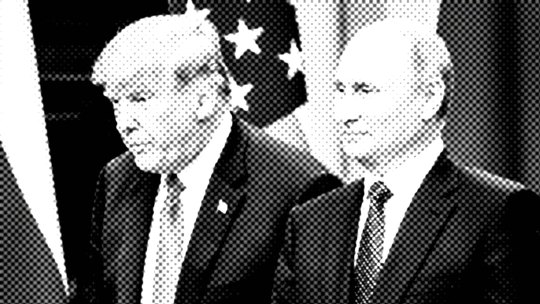
View On WordPress
#Apple Podcasts#Cornucopia Radio#Craig Unger#IRN#Kompromat#NPR One#NWCZ Radio#Putin#russia#The Source WMNF HD3#Trump#WNRM The Root
0 notes
Text
https://www.kgbfantasticfiction.org/2020/11/05/william-gibson-cat-rambo-nov-18th/
0 notes
Photo
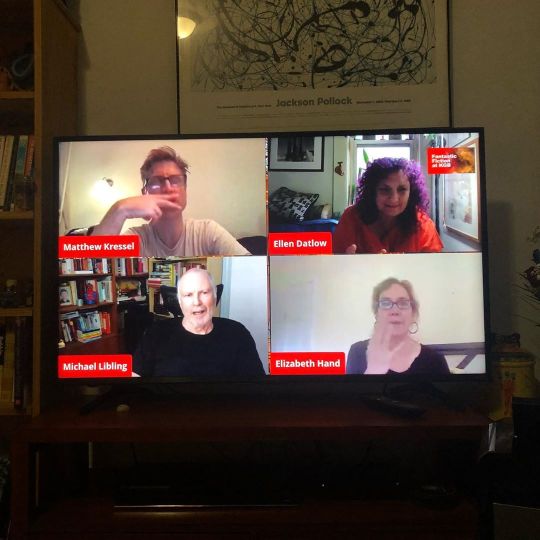
Happy to be attending KGB Fantastic Fiction to hear @michaelliblingwriter and @scary_neary! Live on YouTube. (at New York, New York) https://www.instagram.com/p/CEFsjMNDmXH/?igshid=19eky8r5z871c
0 notes
Text
Handpicked Happening: Bigger than me
Meet Glory Edim. In addition to working closely with creators as Kickstarter’s Publishing Outreach Specialist, she’s the founder of Well-Read Black Girl (WRBG), a book club and online platform celebrating Black literature. (Get her TinyLetter here.) Take it away, Glory!
What should people know about Well-Read Black Girl?
I want Well-Read Black Girl to be much bigger than me. I take the word “amplification” quite literally; every writer deserves to championed on a grand scale. By focusing primarily on novels by Black women, I'm building a community that's dedicated to supporting their work.
What are some things you’ve learned since launching it?
1. Reading changes people’s perspectives, and ultimately their lives.
2. Everyone has a story, and helping others share their story is a privilege.
3. Be bold with your creativity and take risks, even when you’re afraid.
What was the last great book you finished?
What We Lose by Zinzi Clemmons, out this July.

Photograph by Medina Dugger
Eight projects I love
[reads]
Terre Magazine
Never Built New York
Fantastic Fiction at KGB
CAST, STAGE, AUTHOR
Oakland’s Mamacitas Cafe
As the Crow Flies: Volume One
Brooklyn Deep: Reporting Our Truth
Recommended reading
Exit West by Mohsin Hamid
No One Is Coming to Save Us by Stephanie Powell Watts
We Are Never Meeting in Real Life by Samantha Irby
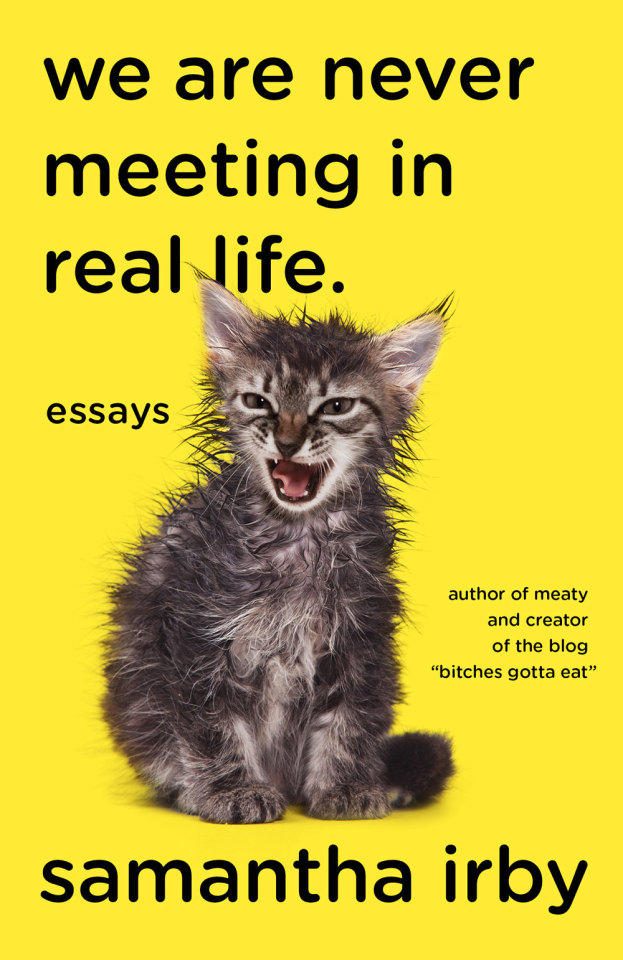
Five links I love
Seriously, everything is funny to Samantha Irby (Elle)
How Maya Angelou taught me to live a full life (BuzzFeed)
Remembering the great poet Gwendolyn Brooks at 100 (NPR)
How a trained journalist is using public art to expose media racism (ArtNet)
The rareness and difficulty of love: on James Baldwin’s Giovanni’s Room (LitHub)
Etc.

Illustration by Shannon Wright
33 notes
·
View notes
Text
Fantastic fiction needs your help
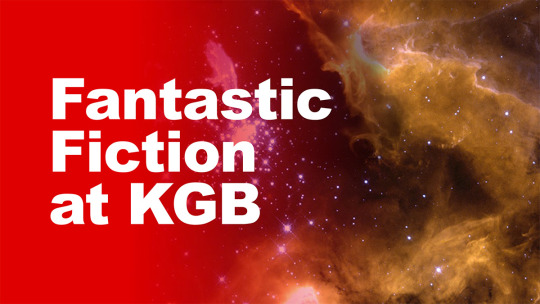
Matthew Kressel:
Fantastic Fiction at KGB is a monthly reading series hosted by Ellen Datlow and Matthew Kressel, held on the third Wednesday of every month at the famous KGB Bar in Manhattan. They are looking to fund several more years of their popular reading series via a Kickstarter fundraiser, running from May 17th through June 14th, 2017.
Fantastic Fiction features luminaries and up-and-comers in speculative fiction. Their past readers include Joyce Carol Oates, Lucius Shepard, Jeffrey Ford, N.K. Jemisin, Scott Westerfeld, Kelly Link, Paul Tremblay, Laird Barron, China Miéville, Nancy Kress, Peter Straub, James Patrick Kelly, Victor LaValle, Joe Hill, Jack Ketchum, Brian Keene, Samuel Delany, Holly Black, Michael Swanwick, Kit Reed, Andy Duncan, Richard Bowes, Catherynne M. Valente, Jeff VanderMeer, Naomi Novik, Elizabeth Bear, Lev Grossman, and a host of other talented authors. (For a full list of their past readers click here).
The series brings together a diverse community of writers, editors publishers, agents and fans into one location each month. They also publish a monthly podcast audio of the readings so people who cannot attend the event can still enjoy the readings.
Fantastic Fiction needs to raise a minimum of $4,500, which will keep the series funded for three more years. Donors to the Kickstarter can select from many cool rewards, including rare, signed, and special edition books & goodies from Cory Doctorow, Neil Gaiman, Ellen Datlow, Joe Hill, Paul Tremblay, Nancy Kress, Caitlín R. Kiernan, Kathe Koja & many others. Tuckerizations (authors writing your name into a story) by Nancy Kress, James Patrick Kelly, Jeffrey Ford and more, subscriptions to Apex, Lightspeed, Analog, Asimov's and Nightmare magazines, plus many other amazing rewards. Fantastic Fiction hosts Ellen Datlow and Matthew Kressel will be adding new rewards almost every day, so make sure to check back frequently.
Please help support the Fantastic Fiction Kickstarter here.
https://boingboing.net/2017/05/22/kgb-reading-series.html
4 notes
·
View notes